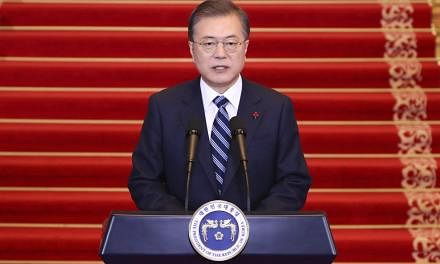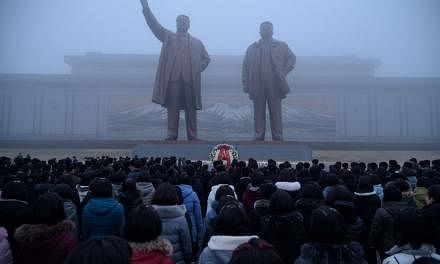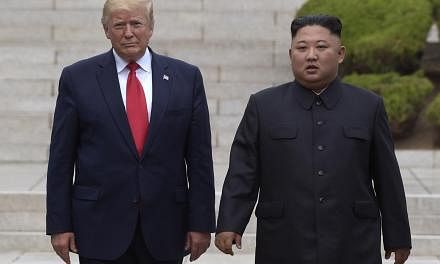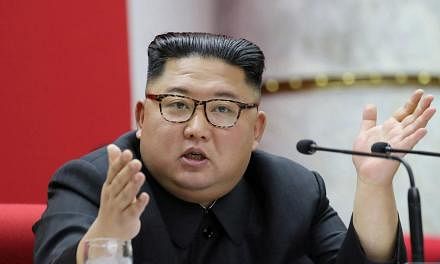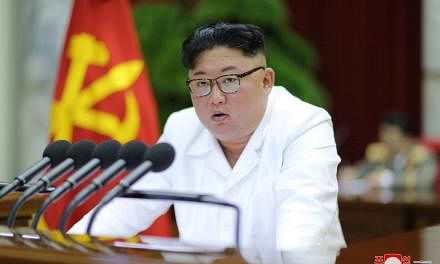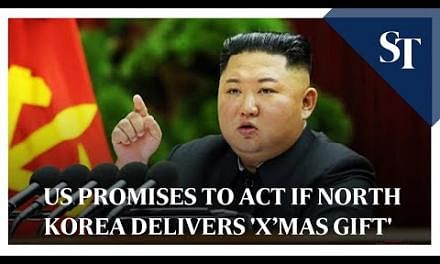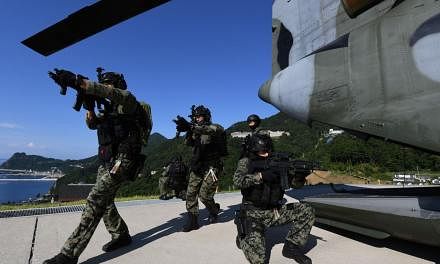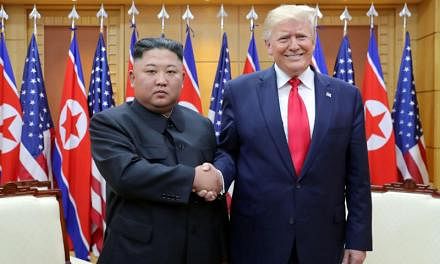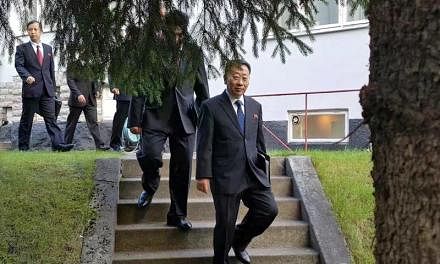SEOUL (WASHINGTON POST) - US President Donald Trump is blaming North Korean leader Kim Jong Un for changing the scope of their summit talks planned for next month (June) and will doubtless air his frustrations when he meets with South Korean President Moon Jae In in Washington on Tuesday (May 22).
But in South Korea, many say the blame for the sudden problems in the diplomatic process lie squarely at the feet of someone else: US National Security Adviser John Bolton.
"There are several land mines on the way to the summit between North Korea and the US," said Mr Chung Dong Young, who served as unification minister during the last progressive administration and is now a lawmaker. "One of those land mines just exploded: John Bolton," Mr Chung told YTN Radio.
Mr Woo Sang Ho, a lawmaker in Mr Moon's ruling Democratic Party, agreed. "Bolton's preposterous 'Libya solution' is a red light in North Korea's summit talks with the US and South Korea," he wrote in a Facebook post.
Officials now in senior positions in the Moon administration know the current US National Security Adviser's background all too well. Many served under pro-engagement president Roh Moo Hyun, at a time when Mr Bolton was a strong proponent inside the George W. Bush administration of the invasion of Iraq and of regime change in North Korea.
"I think a lot of people who were involved with the Roh administration are concerned about Bolton because he was such a neoconservative at the time, and it seems that he hasn't changed," said Dr Lee Geun, a professor of political science at Seoul National University. "People are worried that he's going to interfere and botch the process."
A spokesman for Mr Bolton could not immediately be reached for comment.
After meetings with top officials here last week, one American analyst remarked - only half in jest - that the South Koreans detested Mr Bolton as much as the North Koreans.
Mr Moon's visit to Washington on Tuesday was scheduled in the wake of his own feel-good summit with Mr Kim at the end of April and was intended to help Mr Trump prepare for his summit with the North Korean leader, scheduled for June 12 in Singapore.
Mr Trump had repeatedly said the talks were shaping up well, even calling Mr Kim nice for releasing three American hostages held for more than a year. Until last week, that is, when North Korea made clear it had no interest in unilateral nuclear abandonment and would reconsider proceeding with the summit if that was the condition.
This followed Mr Bolton's appearance on the Sunday shows on May 13 to tout the "Libya model" whereby Colonel Muammar Gaddafi gave up his nuclear weapons programme in 2003 in return for sanctions relief.
The North Korean regime, however, remembers what happened afterward: Col Gaddafi was overthrown and brutally killed by his opponents.
This repeated mention of Libya caused Mr Kim Kye Gwan, North Korea's Vice-Foreign Minister and a figure well-known to American officials thanks to his role in 2005 denuclearisation talks, to denounce Mr Bolton.
He said North Korea could "not hide a feeling of repugnance towards" Mr Bolton, a man the regime had previously derided as "human scum" and a "bloodsucker".
The Chosun Sinbo, a pro-Pyongyang newspaper based in Japan, doubled down on the criticism, saying the "super-hardline" Mr Bolton "has no clear ideology or theory".
"Instead, he is a simple follower of simple thinking, racism and the narrow-minded America First policy," the paper wrote.
Mr Lee Jong Seok, who served as South Korea's unification minister in the later years of the Roh administration, said the two sides seized on different lessons from Libya.
Mr Bolton looked at it as a successful case of denuclearising a rogue regime, while North Korea focused on the dictator's grisly end.
"Bolton created a mess by bringing up the 'Libya Model', which is deeply dreaded by Pyongyang," Mr Lee said, adding that he actually considered Mr Kim Kye Gwan's response low-key in the circumstances.
"Things would have gotten out of hand had it not been for the immediate follow-up from Trump himself," Mr Lee said.
Mr Trump contradicted Mr Bolton, saying he was not thinking of a Libya model - "we decimated that country" - but an outcome where Mr Kim Jong Un remained in power and his economy flourished under a denuclearisation deal.
Others play down concerns about Mr Bolton, noting that he is in frequent contact with his South Korean counterpart.
"I do not worry about Bolton," said Mr Moon Chung In, a usually outspoken adviser to the South Korean president. "He will follow President Trump's lead."
The biggest problem comes, experts here say, from Mr Trump's fundamental misunderstanding of North Korea's interests.
The regime in Pyongyang has never said it was prepared to single-handedly give up its nuclear programme but has instead repeatedly made it clear this would have to be part of a "phased and synchronous" process that would involve rewards for North Korea along the way.
"Kim Jong Un coming out to talks is not an act of one-way surrender, but a movement to adjust mutual interests," said Mr Lee Jong Seok, now at the pro-engagement Sejong Institute outside Seoul.
"It's not that North Korea rejects complete, verifiable and irreversible denuclearisation, but rather they need a tangible promise from Washington in return."
While some here think the Trump administration does not adequately understand North Korea's negotiating tactics, others think Mr Trump is practising his own "art of the deal".
Mr Bolton's posturing looks like a ploy to Dr Nam Sung Wook, a senior intelligence official under a conservative government who is now professor of North Korean studies at Korea University.
"Trump would have been well aware of Bolton's hawkish stance when hiring him, and Bolton is now effectively playing the role of 'bad cop'," Dr Nam said. "I don't think the Libya model was part of Washington's strategy from the beginning, but was just brought up to raise the stakes as much as possible before the summit. That's Trump's negotiation strategy."
Either way, many in South Korea are worried about what happens if the Singapore summit fails to meet expectations - or if it produces a denuclearisation deal that North Korea fails to adhere to.
Mr Bolton is widely perceived to have a penchant for military action, as illustrated in a column he wrote for the Wall Street Journal in February laying out the legal arguments for strikes on North Korea.
"In South Korea, many people, regardless of their political orientation, are not fond of John Bolton," said one senior official close to Mr Moon, asking for anonymity to discuss the sensitive relationship.
"He seems to think the US can fight another war on the Korean Peninsula, so from our perspective, as the people living on the Korean Peninsula, he is very dangerous."

